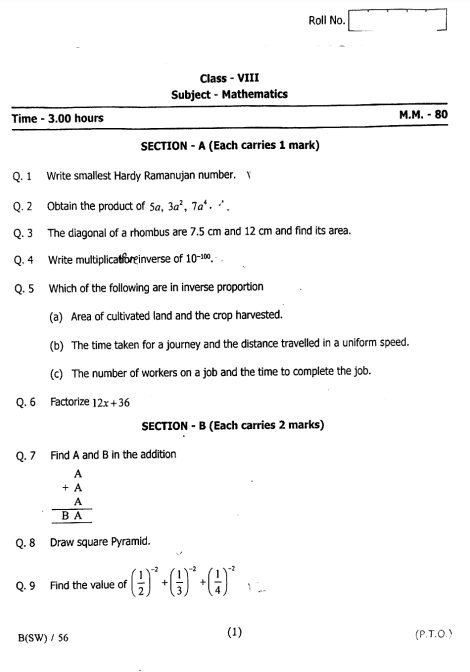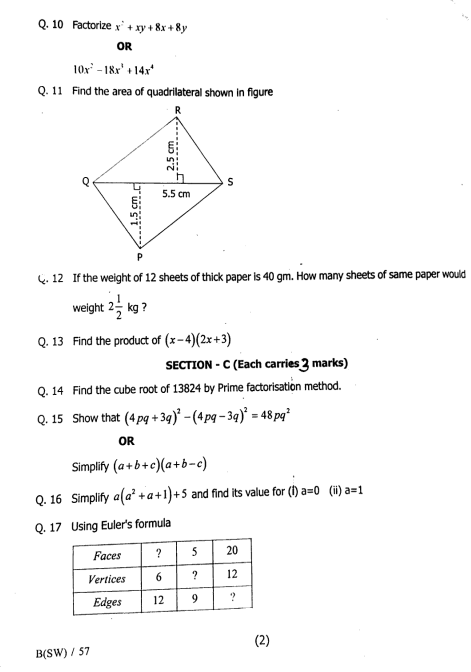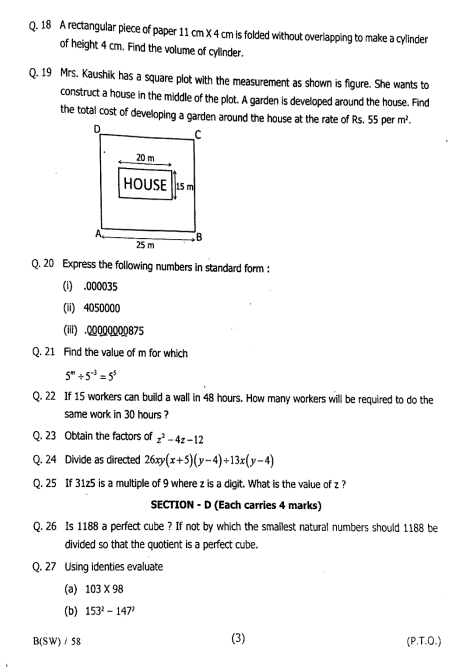CBSE Class 8 Maths Sample Papers : With the help of our website, which has an extensive collection of Previous Paper of Class 8 CBSE Board, you may successfully prepare for your Class 8 CBSE Board Exam. Get access to a large selection of past exam questions that have been carefully chosen to cover subjects related to the Class 8 CBSE Board course . Download practice tests in several formats, such as multiple-choice questions (MCQs) and descriptive questions, to help you prepare for exams and increase your confidence. With the help of our platform, you can revise with concentrate and recognize important themes and question formulation trends. Get ongoing help and direction to help you prepare for and pass the CBSE Board Exam.
- Introduction : CBSE Class 8 Maths Sample Papers
- Download : CBSE Class 8 Maths Sample Papers with Solution
- Syllabus : CBSE Class 8 Maths Sample Papers
- Exam Pattern : CBSE Class 8 Maths Sample Papers
- Significance of CBSE Class 8 Maths Sample Papers
- Tips for Good Preparation : CBSE Class 8 Maths Sample Papers
- FAQs : CBSE Class 8 Maths Sample Papers
Introduction : CBSE Class 8 Maths Sample Papers
An introduction to the Class 8 Maths exam usually includes a number of elements intended to assess students’ linguistic ability, comprehension, and analysis.
Purpose
The Class 8 Maths exam has several functions, such as gauging pupils’ comprehension of mathematical ideas, assessing their academic development, and offering suggestions for development. It also serves as a standard for advancement to the following grade level and gets pupils ready for college by setting the groundwork for their future mathematical pursuits. The test also helps pupils become more confident, enhance their analytical skills, and strengthen their capacity for critical thought and logical reasoning. All things considered, the test is extremely important to students’ academic careers because it gives them chances to study, grow, and advance in mathematics.
Components
Test structure
Multiple-choice, short-answer, and long-answer questions are frequently included in test structures. Each segment may receive a different number of marks, and exams frequently have a time limit.
Exam Preparation
Students should review the required material, work through sample questions, hone their practice problem and mathematics basics, increase their critical thinking.
All things considered, the Class 8 Maths exam (CBSE Class 8 Maths Sample Papers) is a crucial instrument for evaluating students’ problem solving skills, capacity for critical thought, and enjoyment of literature. It also offers insightful information about students’ academic achievement and areas in need of development.
Download : CBSE Class 8 Maths Sample Papers with Solution
| Title | Sample Papers |
|---|---|
| CBSE Class 8 Maths Sample Papers Set 1 | Download Here |
| CBSE Class 8 Maths Sample Papers Set 2 | Download Here |



Syllabus : CBSE Class 8 Maths Sample Papers
The following are the main subjects covered in the CBSE Class 8 Maths Syllabus. Students can review the Class 8 CBSE Syllabus to obtain specifics on subtopics beneath each main topic. For the time being, review the Class 8 Mathematics course outline provided below.
| Unit | Unit Name | Sections |
| 1 | Number System | Rational Numbers Powers Squares, Square roots, Playing with numbers |
| 2 | Algebra | Algebraic Expressions |
| 3 | Ratio and Proportion | Ratio and Proportion |
| 4 | Geometry | Understanding shapes Representing 3-D in 2-D Construction |
| 5 | Mensuration | Mensuration |
| 6 | Data Handling | Data Handling |
| 7 | Introduction to Graphs | Introduction to Graphs |
CBSE Class 8 Maths Syllabus Chapters Names
Chapters | Topics |
|---|---|
1: Rational Numbers |
|
2: Linear Equations in One Variable |
|
3: Understanding Quadrilaterals |
|
4: Data Handling |
|
5: Squares and Square Roots |
|
6: Cubes and Cube Roots |
|
7: Comparing Quantities |
|
8: Algebraic Expressions and Identities |
|
9: Mensuration |
|
10: Exponents and Powers |
|
11: Direct and Inverse Proportions |
|
12: Factorisation |
|
13: Introduction to Graphs |
|
Exam Pattern : CBSE Class 8 Maths Sample Papers
| Aspect | Description |
|---|---|
| Total Marks | 80 to 100 marks |
| Types of Questions |
|
| Topics Covered |
|
| Internal Breakdown | Sections based on topic weightage; Marks allocation per question |
| Time Duration | 2 to 3 hours |
| Guidelines |
|
| Marking Scheme | Marks per question; Deduction for incorrect or incomplete answers |
Significance of CBSE Class 8 Maths Sample Papers
The significance of CBSE Class 8 Maths Sample Papers lies in their ability to serve as valuable study resources for candidates preparing for the CBSE Board examination. Here are some key reasons why these question papers are important:
Exam Blueprint Revealed:
The actual exam is modeled by these papers. You can learn a lot about the arrangement of the questions, the relative importance of the various areas on the syllabus, and even the degree of difficulty by carefully examining them. This enables you to customize your study and give priority to the subjects that need greater attention.
Improving Your Skills:
Using past year papers for practice is similar to taking practice exams in a real exam setting. You get to put your speed, accuracy, and conceptual understanding to the test in a virtual setting. This assists in determining your areas of strength and weakness prior to the exam, enabling you to improve your strategy and reinforce your comprehension of important subjects.
Building Exam Stamina:
The Class 8 CBSE Board exam may have a time limit, therefore success depends on your ability to manage your time well. You can improve your endurance and time management abilities for the test by using previous year’s papers. You can learn to pace yourself, prioritize questions, and stay away from becoming bogged down on any one problem by practicing in a timed environment.
Increasing Confidence:
Completing last year’s papers successfully boosts your self-assurance and eases exam anxiety. Observing that you can appropriately respond to questions validates your understanding and inspires you to keep trying. Your overall exam performance is significantly impacted by this positive reinforcement.
Finding Recurring Patterns:
Although the precise questions won’t be asked again, reviewing previous exams frequently identifies patterns in the subjects and question types that are asked again. This enables you to create focused strategies for answering the kinds of questions you might encounter on the actual exam by anticipating their types.
It’s like having a secret weapon when you use the CBSE Class 8 Maths Sample Papersin your preparing approach. They sharpen your abilities, give you confidence boosts, and offer priceless insights, all of which considerably raise your chances of succeeding on test day.
Tips for Good Preparation : CBSE Class 8 Maths Sample Papers
Recognize the test and syllabus:
Visit the CBSE Board website to download the official announcement and curriculum.
Recognize the format of the exam (number of sections, weighted scores, time allotment).
Learn everything there is to know about the subjects included on the curriculum for each area.
Create a Timetable and Study Plan:
Make a realistic study schedule with time allotted for each section based on the syllabus and your preferred method of learning.
Establish study times on a daily or weekly basis, and try your best to maintain them.
Be adaptable and make necessary changes to your plan, but consistency is essential.
Establish a Robust Base:
Pay close attention to the fundamental ideas in each area, paying particular attention.
Learn the fundamental, shortcuts, and approaches to solving problems.
Make Use of Educational Resources
Make use of top-notch study resources, such as online courses, textbooks, and coaching materials (if necessary).
Exam patterns and time management exercises can be learned by looking at previous year’s question papers and practice exams.
Consistent Practice:
Every day, complete practice questions from different sources.
Prioritize precision while progressively picking up speed.
Examine your errors and determine what needs to be improved.
By following these tips and dedicating yourself to consistent preparation, you can significantly increase your chances of success in the Class 8 CBSE (CBSE Class 8 Maths Sample Papers) Board Exam. Remember, the key is to start early, work hard, and stay focused on your goal.
FAQs : CBSE Class 8 Maths Sample Papers
Q1: What topics are covered in the Class 8 Maths exam?
A1: The Class 8 Maths exam usually covers a wide range of topics including Algebra, Geometry, Mensuration, Data Handling, etc. Students should thoroughly revise all chapters prescribed in their curriculum.
Q2: How should I prepare for the Class 8 Maths exam?
A2: To prepare for the exam, create a study schedule and allocate time for each topic. Practice solving problems regularly, refer to textbooks and supplementary materials, and clarify doubts with teachers or peers.
Q3: Are there any important formulas or theorems to memorize for the exam?
A3: Yes, students should memorize important formulas and theorems in Algebra, Geometry, Mensuration, etc. Some examples include Pythagoras theorem, formulae for area and perimeter of various shapes, algebraic identities, etc.
Q4: What type of questions can I expect in the exam?
A4: Questions in the Class 8 Maths exam can vary in type, including multiple-choice questions, short-answer questions, and long-answer questions. Be prepared for conceptual questions as well as numerical problems.
Q5: Is it necessary to practice previous years' question papers?
A5: Yes, practicing previous years’ question papers can give you an idea about the exam pattern, important topics, and the level of difficulty. It also helps in improving time management skills.






